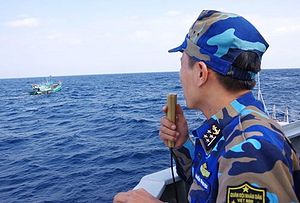Last week, the head of Thailand’s peacekeeping operations center paid a visit to Vietnam. Though this was just one of several interactions between the two fellow mainland Southeast Asian states, it nonetheless highlighted the role of peacekeeping as an area of cooperation in their bilateral ties as well as within their broader foreign policies.
As I have observed previously in these pages, despite a history of animosity for much of the Cold War, contemporary bilateral ties between Vietnam and Thailand have included some defense collaboration as well. Defense ties between the two have covered a wide range of areas, from addressing transnational crimes to regulating fishermen within maritime boundaries, and there have been efforts to further strengthen ties in specific areas as well, with steps such as the inauguration of a new defense policy dialogue in 2017 being among them.
One aspect of the security relationship of note has been in peacekeeping. Both countries have been involved in this area to varying degrees, and Thailand has already been assisting Vietnam as it expands its engagements in this area, including through the UN mission in South Sudan. Both sides are also involved in ASEAN-related peacekeeping activities: for instance, when Vietnam takes over the rotating ASEAN chairmanship from Thailand next year, it will help host meetings involving the ASEAN Peacekeeping Centers Network (APCN) in 2020.
Last week, this aspect of the defense relationship was in the headlines again with the visit of the director of Thailand’s peacekeeping operations center. Jensit Konsil, the director of the Thai Center on Peacekeeping Operations, was on a scheduled trip to Vietnam.
The visit consisted of a series of interactions. In terms of meetings, Jensit met with Hoang Kim Phung, the director of the Vietnam Department of Peacekeeping (VNDPKO), who hosted a reception for his Thai counterpart as well on September 10. Per the official account of the engagement by Vietnam’s defense ministry, the two discussed issues related to bilateral defense ties between the two countries as well as related to peacekeeping more generally, including furthering interactions to include sharing experiences in UN peacekeeping missions and making peacekeeping a regular topic in high-level defense engagements.
In terms of tangible cooperation, a case in point was the fact that the two sides also discussed the possibility of inking a cooperation deal between the two peacekeeping centers. While details remain unclear, per the ministry’s account, the agreement would cover aspects such as delegation exchanges, training courses, and exercises that would be hosted by each of the countries.
To be sure, this is only one aspect of the wider defense relationship between Thailand and Vietnam. Nonetheless, as we see developments for the rest of 2019 and into 2020, when Vietnam both hosts ASEAN and holds a non-permanent seat on the United Nations Security Council, the peacekeeping component of ties between the two countries will continue to be important.

































